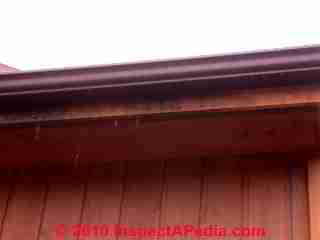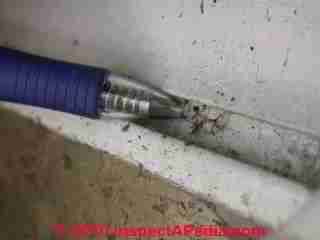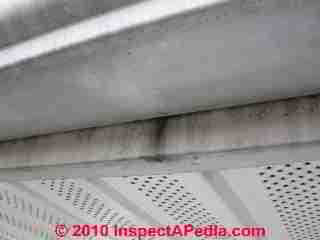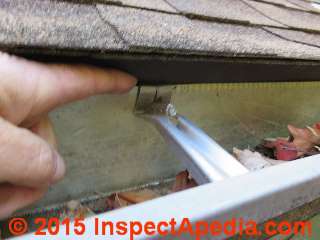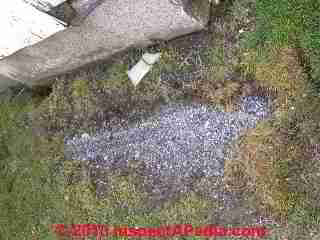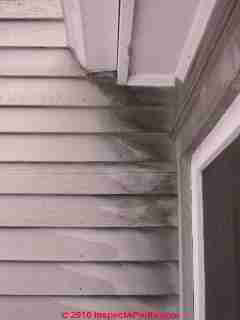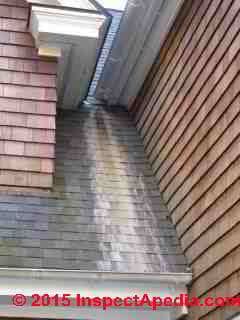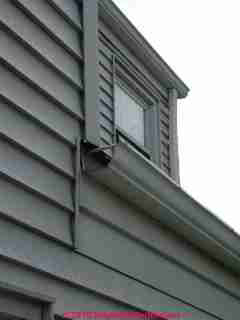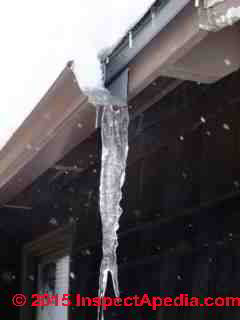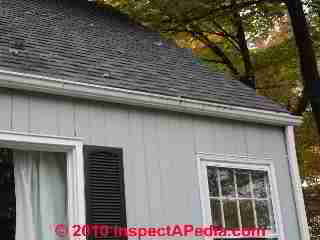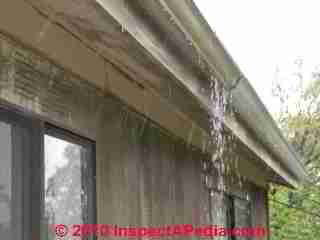 Roof Gutter Defects List Part II
Roof Gutter Defects List Part II
Photo Guide to More Defects & Troubles at Roof Gutters
- POST a QUESTION or COMMENT about troubleshooting roof gutters & drainage systems, problems with roof gutters, downspouts & roof drainage control systems
Roof gutter leak problems, part II.
This article describes additional problems with roof gutters that cause leaks and building water entry, including backflowing gutters: leaks between the gutter and fascia board, and gutter installation errors (poor support, bad slope.
We explain the cause, cure or prevention of sagging gutters, and we explain how to notice drip lines on the ground close to a building beneath gutters - an indicator of the history of gutter spillage and a possible explanationof wet basements or crawl spaces.
We discuss the importance of gutter end caps. We also discuss the problems that occure when gutters are installed on a building with no roof overhang.
InspectAPedia tolerates no conflicts of interest. We have no relationship with advertisers, products, or services discussed at this website.
- Daniel Friedman, Publisher/Editor/Author - See WHO ARE WE?
Other Gutter Installation Defects, Leaks, Damage
Article Contents
[Click to enlarge any image]
Backflowing Gutters
"Backflowing gutters" is a term we coined to refer to the problem that occurs when water falling off the roof edge runs behind the gutter or between the gutter and the building fascia rather than falling into the gutter.
There are several principal causes of gutter back-flow:
- The gutters or roof drip edge have been improperly installed
(or roof drip edge was improperly installed) so that the drip edge lower or vertical face is placed behind the gutter back wall rather than over the gutter trough.
Details are at ROOF DRIP EDGE IMPROPERLY INSTALLED Behind Gutters
and for complete details about this topic
see DRIP EDGE FLASHING for ROOFS - The gutters are loose or improperly installed too far out
from the building eaves, or more likely, the gutters have become loose so that a gap has opened between the building fascia or wall top and the gutter back wall. When the loose gutter has moved far enough from the building fascia or wall top, roof runoff spills behind rather than into the gutter.
See LOOSE GUTTERS. - Clogged gutters may also "backflow" -
that is, sending water over the back edge of the gutter, depending on just how the gutter is sloped or supported on the building.
See CLOGGED GUTTERS.
Often visual clues from the ground level can tell you that gutters have been back-flowing even if it's not raining at the time you are inspecting. But it may take an up-closer roof-edge from a ladder to see just what's going on with a backflowing roof gutter.
At a building inspection of a new home during a heavy rainfall we observed just this condition. Water was pouring down the roof, behind the gutter, and onto the front entry steps. Standing in the rain we (DF) knocked on the door. The builder answered and we spoke through a sheet of falling water.
"Look at all this water falling here! It's running behind the gutters. You might want to ask your gutter installer to take a look at this installation," we suggested with some tact.
"Ya know, " replied the builder, "we asked our gutter subcontractor about that. He said that it's normal, that 'they all do that'".
That observation was in a sense correct. All of the gutters installed by that contractor did backflow - they were all installed improperly. Often we find that when an installer is not up to speed on a building detail, the same mistake is made at every installation. "They all do that" can mean "they're all wrong."
OPINION: We divide home builders into two groups. Many are very well informed about good construction practices and make it their job (and what they're paid-for) to be sure that the job is executed properly, giving the new owner the best home with the least problems possible.
A second group of builders are folks who do not know construction practices, but perhaps are good organizers, arranging financing and scheduling subcontractors. If your builder is a member of group 2, s/he is at the mercy of the subcontractors, and too often, no one is minding the store.
Roof Drip Edge Improperly Installed: Behind Gutters
Installing the roof drip edge behind the rear wall of the gutter means that some roof drainage will run by capillary action down the drip edge and pass behind rather than into the gutter. If the gutter also happens to be a bit loose, not snug against the fascia and drip edge, still more water will pass behind it.
Our detailed photo (below left) shows a gap between the gutter back upper edge and the roof drip edge. Where this gutter is higher along the fascia, the drip edge is actually behind the gutter back wall.
You may think the gutters are working properly, but if an inspection during rain shows a lot of water running from behind the gutters, either the gutters are clogged and overflowing, or the drip edge is improperly installed.
The stains on the fascia in our second photo (above right) often indicate a drip edge problem and gutter "backflow" behind the gutter itself, or a gutter overflow problem due to clogging.
Above I'm pointing to the trouble (on another home). The roofer installed the drip edge tight against the fascia. There was no way that the gutter installe was going to get the upper edge of the gutter behind the drip edge. Some rain runoff, by capillary action runs up under the shingle drip edge and down the fascia behind the gutter.
See DRIP EDGE FLASHING for ROOFS for details.
Sagging Gutters Overflow
Sagging gutters may be caused by loose or lost gutter mounting hardware, improper or inadequate slope, or the weight of water or debris that cause the gutter to bend.
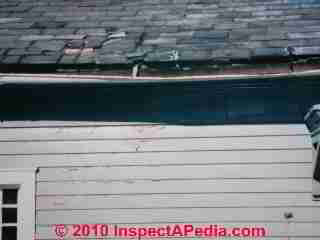
At above left, when the roof is repaired (or replaced) the gutter needs to be replaced as well.
At the overflowing gutter above it may be possible to repair this horrible gutter overflow by clearing a blockage and checking/correcting the gutter slope.
Drip Lines or Wash Areas on Ground Indicate History of Gutter Overflow
Simply looking at the ground under the eaves of a building may disclose a small "trench" or "wash area" that marks where soil has washed away directly under the building eaves due to roof runoff spillage. Finding a drip line under a building eaves is a good indicator that the gutters have been spilling in that location for some time.
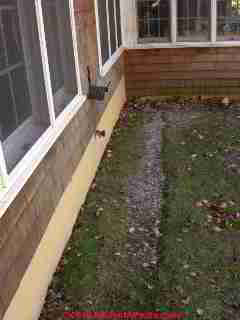
At above left our photo shows a deep drip line from roof spillage outside of a building extension built over an inaccessible crawl area. There is risk of hidden water entry and water/moisture related damage in that area.
Above we show a wash area at the corner of a building. Often if you look "up" at this location you'll see the end of a gutter that has been spilling-over.
Even before entering the building to inspect its basement or crawl area for water entry or dampness, these clues are a red flag.
Gutter End Caps - Keep Them In Place
Since most folks don't spend a lot of time thinking about their gutters and leaders (until the basement is flooded), people don't notice that the end caps at some gutters have been omitted at original installation, are leaking, or have been lost.
The result is often water splashing down walls, causing leaks, water entry, rot, or insect attack.
At above right the installer eschewed a downspout, leaving the gutter end cap off to use the lower roof for drainage of the upper gutter. The result is ugly.
Qbove and again below you can see that the gutter end cap has been lost at left and left-off deliberately at below right.
Installing Gutters on buildings with No Eaves Overhang
If your building design includes no eaves overhang (or soffit) it is especially important to maintain the gutters and downspouts.
That's because if these gutters overflow, water won't just spill onto the ground by the foundation, it will first soak the building walls or even enter at windows.
A close look at the gutter on this building shows so much debris on the gutter face that it's probable that the gutter has been overflowing down the home's walls.
Problems with the routing and disposal of roof drainage through downspouts or leaders are discussed separately
at DOWNSPOUT / LEADER DEFECTS.
This article series discusses how to choose, install, diagnose & maintain roof gutters & downspouts, & roof drainage systems to prevent building leaks and water entry.
...
Continue reading at GUTTER HANGERS or select a topic from the closely-related articles below, or see the complete ARTICLE INDEX.
Or see these
Recommended Articles
- DRIP EDGE FLASHING for ROOFS
- DOWNSPOUT / LEADER DEFECTS
- GUTTER CAPS
- GUTTER DEFECTS LIST
- GUTTER HANGERS
- GUTTER REPAIR, LEAKY JOINT
- GUTTER SCREENS
- GUTTER SIZES
- GUTTER TYPES
Suggested citation for this web page
GUTTER DEFECTS, MORE at InspectApedia.com - online encyclopedia of building & environmental inspection, testing, diagnosis, repair, & problem prevention advice.
Or see this
INDEX to RELATED ARTICLES: ARTICLE INDEX to GUTTERS & DOWNSPOUTS
Or use the SEARCH BOX found below to Ask a Question or Search InspectApedia
Ask a Question or Search InspectApedia
Questions & answers or comments about troubleshooting roof gutters & drainage systems, problems with roof gutters, downspouts & roof drainage control systems.
Try the search box just below, or if you prefer, post a question or comment in the Comments box below and we will respond promptly.
Search the InspectApedia website
Note: appearance of your Comment below may be delayed: if your comment contains an image, photograph, web link, or text that looks to the software as if it might be a web link, your posting will appear after it has been approved by a moderator. Apologies for the delay.
Only one image can be added per comment but you can post as many comments, and therefore images, as you like.
You will not receive a notification when a response to your question has been posted.
Please bookmark this page to make it easy for you to check back for our response.
IF above you see "Comment Form is loading comments..." then COMMENT BOX - countable.ca / bawkbox.com IS NOT WORKING.
In any case you are welcome to send an email directly to us at InspectApedia.com at editor@inspectApedia.com
We'll reply to you directly. Please help us help you by noting, in your email, the URL of the InspectApedia page where you wanted to comment.
Citations & References
In addition to any citations in the article above, a full list is available on request.
- Mark Cramer Inspection Services Mark Cramer, Tampa Florida, Mr. Cramer is a past president of ASHI, the American Society of Home Inspectors and is a Florida home inspector and home inspection educator. Mr. Cramer serves on the ASHI Home Inspection Standards. Contact Mark Cramer at: 727-595-4211 mark@BestTampaInspector.com
- John Cranor [Website: /www.house-whisperer.com ] is an ASHI member and a home inspector (The House Whisperer) is located in Glen Allen, VA 23060. He is also a contributor to InspectApedia.com in several technical areas such as plumbing and appliances (dryer vents). Contact Mr. Cranor at 804-873-8534 or by Email: johncranor@verizon.net
- Building Pathology, Deterioration, Diagnostics, and Intervention, Samuel Y. Harris, P.E., AIA, Esq., ISBN 0-471-33172-4, John Wiley & Sons, 2001 [General building science-DF - ** Particularly useful text **
- Dampness in buildings, Diagnosis, Treatment, Instruments, T.A. Oxley & E.G. Gobert, ISBN 0-408-01463-6, Butterworths, 1983-1987 [General building science-DF]
- Certainteed Weatherboard fiber cement siding and trim products - see certainteed.com/ or see certainteed.com/resources/sidingandtrimspecsheet.pdf
- "Flashing: the plain solution to leaky walls", Thomas E. Remmele, Manager, Technical Services, Sto Corporation, Building Standards, November/December 1999 p. 21-25.
- In addition to citations & references found in this article, see the research citations given at the end of the related articles found at our suggested
CONTINUE READING or RECOMMENDED ARTICLES.
- Carson, Dunlop & Associates Ltd., 120 Carlton Street Suite 407, Toronto ON M5A 4K2. Tel: (416) 964-9415 1-800-268-7070 Email: info@carsondunlop.com. Alan Carson is a past president of ASHI, the American Society of Home Inspectors.
Thanks to Alan Carson and Bob Dunlop, for permission for InspectAPedia to use text excerpts from The HOME REFERENCE BOOK - the Encyclopedia of Homes and to use illustrations from The ILLUSTRATED HOME .
Carson Dunlop Associates provides extensive home inspection education and report writing material. In gratitude we provide links to tsome Carson Dunlop Associates products and services.


